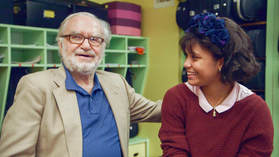 This short essay is the first of two on the same subject, and easily the more positive. If you haven’t watched “Joe’s Violin,” take a short break from whatever you are doing and watch it now. You can find it on its website. Have a hankie or a box of tissues at hand. If you don’t watch it before you read this, then be prepared for lots of spoilers. This short film was nominated for an Academy Award (I think I have to put this little ® about here) but it did not win the Oscar (add another ®). The director, Kahane Cooperman, was robbed. After a very long run producing the “Daily Show” in the Jon Stewart years and during a longer run as my cousin Jacki’s buddy, she told a simply gorgeous story about an old man, a young girl and a violin. The story can be briefly told – and this is your last warning – but not without its essential elements. A drive to collect used but currently unused musical instruments to provide to students in New York City schools prompts an old man, Joe, who is a Holocaust survivor, to donate the instrument he bought in a DP camp after he was liberated. He played it for much of his adult life. It winds up in the hands of a 12-year-old girl from the Bronx. That is the whole story, but does no justice to the telling. We learn a little bit about Joe – he learned to play as a boy; his life and music were interrupted by the Nazis; he spent his entire cigarette ration to buy the instrument because he loved to play; he got old and, at 91, he had to be particularly attentive to his disabled wife. The violin was gathering dust. So he donated it. We learn a little bit about Brianna – she is a student at Bronx Global Learning Institute for Girls; she is the daughter of immigrants; she is chosen from among all of the students to be the custodian of this particular violin (every girl in the school learns to play the violin). They meet. And it turns out that Brianna has learned the melody Joe used to play for his mother, who was among the murdered. But, as you know if you watched the movie, everyone is crying before you find it out. The story, as I said, is simply gorgeous. But it is also a metaphor that has helped me come to terms with a surprising turn in my own spiritual life. The music of traditional Jewish practice (literal and metaphoric) has sustained me all of my adult life. But since I left the pulpit, much of the music is gone. I have my theories about why that is. Some of it, I am certain, is that only my own expectations impel me to observe, and my energy has waned. Some of it is the dissipation of community that once sustained me as I tried to sustain it. And some of it is being tired, my spiritual energy being siphoned in other directions. In fact, where I used to be an active and even boisterous participant in Jewish observance, I am now quiet, even silent. Especially in synagogue, which I attend on Shabbat out of a sense of doing the right thing rather than nurturing my soul, it is the prayers of others that carry my spiritual aspirations heavenward. I listen much more than I speak or sing. I won’t appropriate anything about Joe other than our common humanity. His story includes life experience I am sorry he had and I hope no one else will ever know. But that violin that he played, practicing over and again the melody that connected him to his youth and optimism, is the metaphor for the cherished memories we all try to incorporate and preserve as we get farther and farther away from the source. We deepen their meaning and enrich their expression, leaving our own imprint on them. We put them out into the world for others to share, but they always mean something unique to us. One of my memories that was deepened and enriched was Jewish observance. My imprint was on my practice. But, like Joe’s violin, what it represented has become more than it currently is. The fading clarity of those memories is not enough to sustain them. Fortunately, the world is filled with Briannas, hoping for the chance to pick up the violin and bring the music to life again. I can tell you that her musicianship at 12 years old is certainly not what Joe’s must have been in his prime. But the promise she shows, and the promises she makes, have a profound effect on Joe. She doesn’t play the way he played, but listening to her embrace the music and caress the violin makes it clear that what brought him meaning in the world has been passed along to someone who will cherish it, deepen its meaning and put her own imprint on it. Mostly, that is how I feel in the presence of people who embrace and caress Jewish observance. They don’t do it the way I did – the only correct way, of course – but they cherish it, deepen its meaning and put their own imprint on it. Joe’s violin is no longer in Joe’s hands. But someone very different from him will make it sing. This gorgeous story is so much more than a survivor’s redemption or a pre-teen’s opportunity. It is a gift to the old and the young and a reassurance to them both. And to me.
0 Comments
Leave a Reply. |
AuthorI spent 35 years in the pulpit and learned a few things about the people and the profession Archives
July 2023
Categories |
 RSS Feed
RSS Feed
